2016年高考全国I卷英语听力(含听力音频、听力原文和答案)
2024年新课标全国Ⅰ卷英语真题(含听力)(解析版)
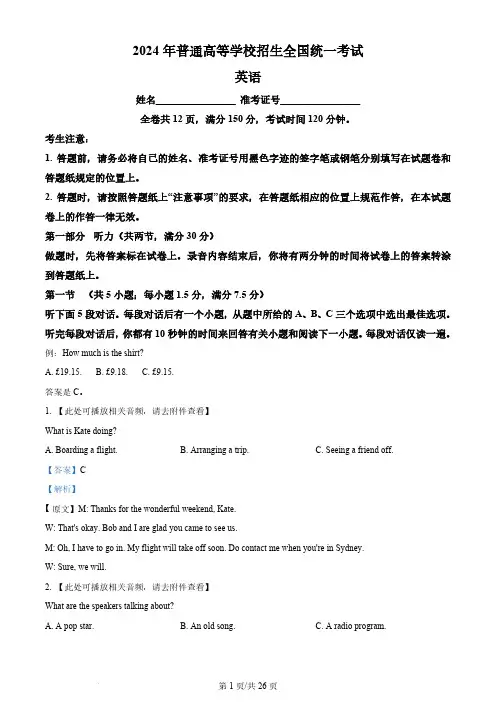
2024年普通高等学校招生全国统一考试英语姓名________________ 准考证号________________全卷共12页,满分150分,考试时间120分钟。
考生注意:1. 答题前,请务必将自己的姓名、准考证号用黑色字迹的签字笔或钢笔分别填写在试题卷和答题纸规定的位置上。
2. 答题时,请按照答题纸上“注意事项”的要求,在答题纸相应的位置上规范作答,在本试题卷上的作答一律无效。
第一部分听力(共两节,满分30分)做题时,先将答案标在试卷上。
录音内容结束后,你将有两分钟的时间将试卷上的答案转涂到答题纸上。
第一节(共5小题;每小题1.5分,满分7.5分)听下面5段对话。
每段对话后有一个小题,从题中所给的A、B、C三个选项中选出最佳选项。
听完每段对话后,你都有10秒钟的时间来回答有关小题和阅读下一小题。
每段对话仅读一遍。
例:How much is the shirt?A. £19.15.B. £9.18.C. £9.15.答案是C。
1. 【此处可播放相关音频,请去附件查看】What is Kate doing?A. Boarding a flight.B. Arranging a trip.C. Seeing a friend off.【答案】C【解析】【原文】M: Thanks for the wonderful weekend, Kate.W: That's okay. Bob and I are glad you came to see us.M: Oh, I have to go in. My flight will take off soon. Do contact me when you're in Sydney.W: Sure, we will.2. 【此处可播放相关音频,请去附件查看】What are the speakers talking about?A. A pop star.B. An old song.C. A radio program.【答案】B【解析】【原文】W: Paul, listen to the radio. It's You've Stolen My Heart, one of the songs played at our wedding.M: Yeah, how beautiful! It's been popular for almost two decades.3. 【此处可播放相关音频,请去附件查看】What will the speakers do today?A. Go to an art show.B. Meet the man's aunt.C. Eat out with Mark.【答案】A【解析】【原文】W: David, forget about Mark. His aunt is in town, so he can't go with us today.M: Oh, what a pity! It's the last day of the art show.4. 【此处可播放相关音频,请去附件查看】What does the man want to do?A. Cancel an order.B. Ask for a receipt.C. Reschedule a delivery.【答案】C【解析】【原文】W: How may I help you?M: I bought a desk and asked for it to be delivered to my house this Friday.W: Yes, what’s the problem?M: I need to have it delivered this Saturday.5. 【此处可播放相关音频,请去附件查看】When will the next train to Bedford leave?A. At 9:45.B. At 10:15.C. At 11:00.【答案】A【解析】【原文】W: Next, please.M: Oh, hi, I missed my 9 o'clock train to Bedford. Do I have to buy another ticket?W: No. The next train leaves at a quarter to ten at Platform 11.M: Thank you.第二节(共15小题;每小题1.5分,满分22.5分)听下面5段对话或独白。
2020年高考全国Ⅰ卷英语试题听力部分(含听力音频、听力原文和答案)
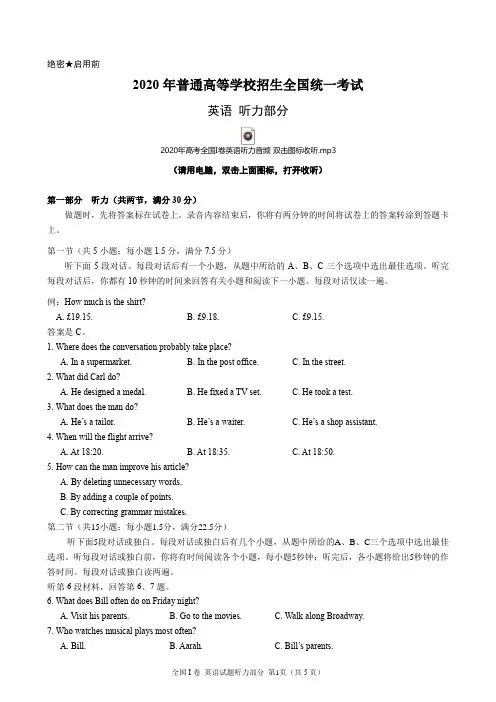
绝密★启用前2020年普通高等学校招生全国统一考试英语听力部分2020年高考全国I卷英语听力音频 双击图标收听.mp3(请用电脑,双击上面图标,打开收听)第一部分听力(共两节,满分30分)做题时,先将答案标在试卷上。
录音内容结束后,你将有两分钟的时间将试卷上的答案转涂到答题卡上。
第一节(共5小题;每小题1.5分,满分7.5分)听下面5段对话。
每段对话后有一个小题,从题中所给的A、B、C三个选项中选出最佳选项。
听完每段对话后,你都有10秒钟的时间来回答有关小题和阅读下一小题。
每段对话仅读一遍。
例:How much is the shirt?A. £19.15.B. £9.18.C. £9.15.答案是C。
1. Where does the conversation probably take place?A. In a supermarket.B. In the post office.C. In the street.2. What did Carl do?A. He designed a medal.B. He fixed a TV set.C. He took a test.3. What does the man do?A. He’s a tailor.B. He’s a waiter.C. He’s a shop assistant.4. When will the flight arrive?A. At 18:20.B. At 18:35.C. At 18:50.5. How can the man improve his article?A. By deleting unnecessary words.B. By adding a couple of points.C. By correcting grammar mistakes.第二节(共15小题;每小题1.5分,满分22.5分)听下面5段对话或独白。
2016年高考英语全国卷II试题及答案(含听力)(精校版)【可修改文字】
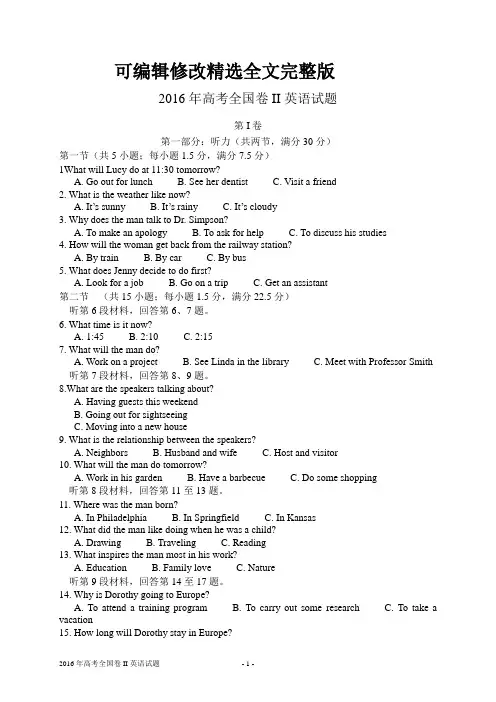
可编辑修改精选全文完整版2016年高考全国卷II英语试题第I卷第一部分:听力(共两节,满分30分)第一节(共5小题;每小题1.5分,满分7.5分)1What will Lucy do at 11:30 tomorrow?A. Go out for lunchB. See her dentistC. Visit a friend2. What is the weather like now?A. It’s sunnyB. It’s rainyC. It’s cloudy3. Why does the man talk to Dr. Simpson?A. To make an apologyB. To ask for helpC. To discuss his studies4. How will the woman get back from the railway station?A. By trainB. By carC. By bus5. What does Jenny decide to do first?A. Look for a jobB. Go on a tripC. Get an assistant第二节(共15小题;每小题1.5分,满分22.5分)听第6段材料,回答第6、7题。
6. What time is it now?A. 1:45B. 2:10C. 2:157. What will the man do?A. Work on a projectB. See Linda in the libraryC. Meet with Professor Smith 听第7段材料,回答第8、9题。
8.What are the speakers talking about?A. Having guests this weekendB. Going out for sightseeingC. Moving into a new house9. What is the relationship between the speakers?A. NeighborsB. Husband and wifeC. Host and visitor10. What will the man do tomorrow?A. Work in his gardenB. Have a barbecueC. Do some shopping听第8段材料,回答第11至13题。
2016-全国卷英语听力+听力原文+答案

2016-全国卷英语听力+听力原文+答案2016普通高等学校招生全国统一考试(新课标I)英语试卷类型A第Ⅰ卷第一部分听力(共两节,满分 30 分)做题时,现将答案标在试卷上,录音内容结束后,你将有两分钟的时间将试卷上的答案转涂到答题卡上。
第一节(共5小题;每小题1.5分,满分7.5分)听下面5段对话,每段对话后有一个小题。
从题中所给的A、B、C三个选项中选出最佳选项,并标在试卷的相应位置。
听完每段对话后,你都有10秒钟的时间来回答有关小题和阅读下一小题。
每段对话仅读一遍。
例:How much is the shirt? A. £19. 15 B. £9. 18 C. £9. 15 答案是 C。
1. What are the speakers talking about?A. Having a birthday party.B. Doing some exercise.C. Getting Lydia a gift.2. What is the woman going to do?A. Help the man.B. Take a bus.C. Get a camera.3. What does the woman suggest the man do?A. Tell Kate to stop.B. Call Kate, s friends.C. Stay away fromKate.4. Where does the conversation probably take place?A. In a wine shop.B. In a supermarket.C. In a restaurant.5. What does the woman mean?A. Keep the window closed.B. Go out for fresh air.C. Turn on the fan.听第6段材料,回答第6、7题。
视听说,U校园英语听力原文
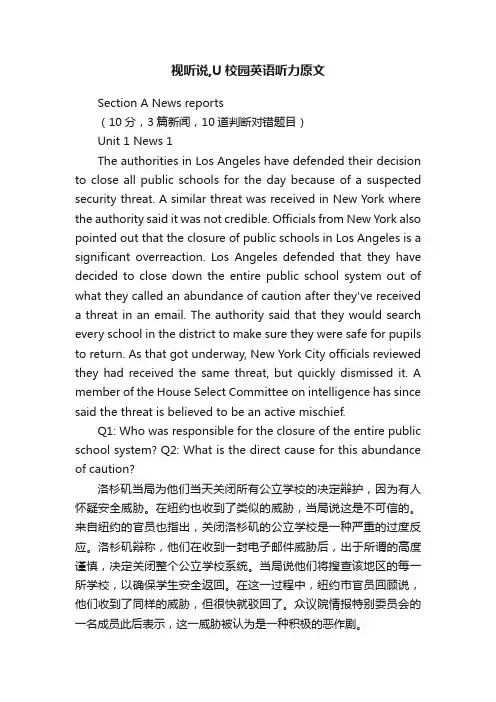
视听说,U校园英语听力原文Section A News reports(10分,3篇新闻,10道判断对错题目)Unit 1 News 1The authorities in Los Angeles have defended their decision to close all public schools for the day because of a suspected security threat. A similar threat was received in New York where the authority said it was not credible. Officials from New York also pointed out that the closure of public schools in Los Angeles is a significant overreaction. Los Angeles defended that they have decided to close down the entire public school system out of what they called an abundance of caution after they've received a threat in an email. The authority said that they would search every school in the district to make sure they were safe for pupils to return. As that got underway, New York City officials reviewed they had received the same threat, but quickly dismissed it. A member of the House Select Committee on intelligence has since said the threat is believed to be an active mischief.Q1: Who was responsible for the closure of the entire public school system? Q2: What is the direct cause for this abundance of caution?洛杉矶当局为他们当天关闭所有公立学校的决定辩护,因为有人怀疑安全威胁。
英语高级视听 听力原文 Unit 12 Working 24 7
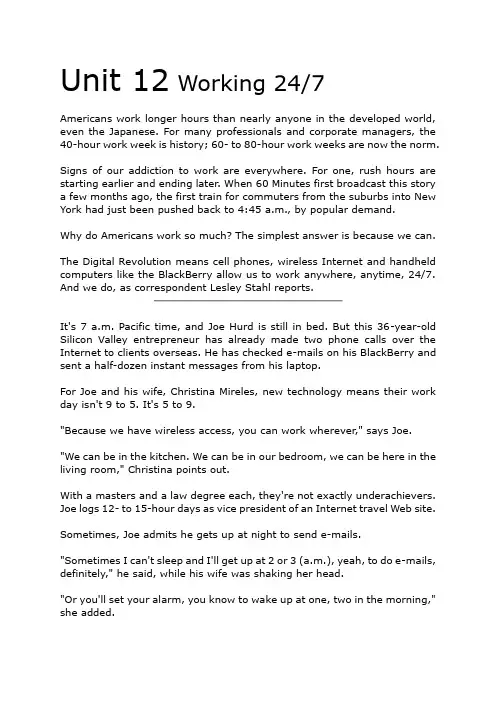
Unit 12 Working 24/7Americans work longer hours than nearly anyone in the developed world, even the Japanese. For many professionals and corporate managers, the 40-hour work week is history; 60- to 80-hour work weeks are now the norm.Signs of our addiction to work are everywhere. For one, rush hours are starting earlier and ending later. When 60 Minutes first broadcast this story a few months ago, the first train for commuters from the suburbs into New York had just been pushed back to 4:45 a.m., by popular demand.Why do Americans work so much? The simplest answer is because we can.The Digital Revolution means cell phones, wireless Internet and handheld computers like the BlackBerry allow us to work anywhere, anytime, 24/7. And we do, as correspondent Lesley Stahl reports.It's 7 a.m. Pacific time, and Joe Hurd is still in bed. But this 36-year-old Silicon Valley entrepreneur has already made two phone calls over the Internet to clients overseas. He has checked e-mails on his BlackBerry and sent a half-dozen instant messages from his laptop.For Joe and his wife, Christina Mireles, new technology means their work day isn't 9 to 5. It's 5 to 9."Because we have wireless access, you can work wherever," says Joe."We can be in the kitchen. We can be in our bedroom, we can be here in the living room," Christina points out.With a masters and a law degree each, they're not exactly underachievers. Joe logs 12- to 15-hour days as vice president of an Internet travel Web site. Sometimes, Joe admits he gets up at night to send e-mails. "Sometimes I can't sleep and I'll get up at 2 or 3 (a.m.), yeah, to do e-mails, definitely," he said, while his wife was shaking her head."Or you'll set your alarm, you know to wake up at one, two in the morning," she added."I do, I do," he replied.Christina, a vice president of a charter school company, works a few hours less than Joe. She says she is no match for her husband in terms of gadgets."Oh, I have the absolute bare minimum, I think. I have two cell phones, a personal and …," Christina explained."That's the bare minimum, America. Two cell phones," Joe interrupted.Not a minute is wasted, even before getting to the office. Christina juggles the two cell phones, returning business and personal calls. She usually eats behind the wheel.On his commute, Joe manages the consulting business he has on the side and even keeps track of new messages on his BlackBerry. But he says he's never tried anything as dangerous as typing out an e-mail while driving in rush hour traffic.Joe's work day is a blur of business meetings, incoming phone calls, and hundreds of e-mails."I can check e-mails and respond to e-mails. I can have a conversation on the telephone. I can have a conversation via IM. And I can keep exactly probably half an ear on a conversation with a person," he says."In the room with you?" Stahl asks."Half, yeah, exactly," Joe says.Asked if he is doing all of these things well when he does them at the same time, Joe says, "You know, this is not neurosurgery we're talking about here … but you can do a lot of that simultaneously."Joe may be able to pull that off, but many corporate executives say the volume of voicemail and e-mail they get has become unmanageable —eating up an average of three hours a day.Combine that with a corporate culture that values endless meetings and "face time" with the boss, and you can see why so many employees toil into the night just to get their "real work" done.60 Minutes visited the corporate headquarters of Best Buy, the electronics retailer, in Richfield, Minn. Employees Stacy Verstraight, Jason Dehne and Marissa Plume say that putting in 60- to 80-hour weeks got them pats onthe back."You know, you'd send an e-mail at nine o'clock at night. And the next thing your co-workers would say, 'Hey, wow, were you working that whole time? Wow. Great job,'" says Marissa.But if you weren't there at the crack of dawn, you were put down."You know, if I come in at nine o'clock or 10 o'clock, I was at a doctor's appointment, you know, people are saying, 'Oh gee. Glad you could show up today.' You know, so it felt [like] a little bit of a dig," says Stacy. "And people were just watching other people. So it felt like a lot of unnecessary pressure.""I canceled booked vacations. I mean I booked vacations, and I'd cancel 'em because I had to work," Jason recalls.In 2002, after a jump in people quitting and filing stress-related health claims, Best Buy launched an experiment: employees would be allowed to work wherever and whenever they wanted, as long as they got their jobs done.That means the unit that Chap Achen manages often looks like a ghost town."Some folks literally don't come in the office for weeks at a time," says Achen.If asked where a specific employee physically is, Achen says he doesn't know. "I couldn't tell you if he was in his basement or he was at a Starbucks with a wireless connection."Since the Best Buy experiment started, Jason's health has improved. Normally at his desk by 7:30 a.m., he now jogs to his local coffee shop and takes his 8 a.m. conference call by cell phone.Marissa, a night owl, now does her best work around midnight from her bedroom."I have to trust that my team is going to get the work done in this environment," says Achen. "And the ironic thing about it is that it's that trust factor that actually makes them work harder for you.""And just as long?" Stahl asked"And just as long," he replied.Or longer. Stacy, Jason and Marissa say they often work more hours than they did before. Not a bad deal for the company. Productivity among employees in the program has jumped a healthy 35 percent."We can spread out our work over seven days of the week," explains Stacy. Asked why that's a positive, Jason says, "It's the way I choose to work." "But if it takes 70 hours to do your job, why doesn't Best Buy go hire more people?" Stahl asked."You know, I am a happier employee, with the trust," says Stacy.Asked if she wants to work the 70 hours, Stacy replied, "I love what I do." The group all said they didn't think they were working too much when asked by Stahl."You're brainwashed," Stahl said, laughing."Maybe we're all crazy," Jason said. "Maybe we are," Stacy added, laughing. Maybe they are: They don't even make more money for the longer hours. But when you try to cut back on the hours, it's not that easy.Mike Moody and Jeff Ward left high stress, six-day-a-week jobs as big-city lawyers because they wanted to spend more time with their wives and children. They decided to do what more and more working mothers are doing — share a job."Well, for the first six months of the job, I was referred to as the new Joanne," says Jeff.The job of assistant in-house counsel at Timberland in Stratum, N.H. had been filled by two women for years."I have two weekends a week. Yeah," says Mike. "And I have a four-day weekend," Jeff adds.It is a pretty sweet deal. They each work three days a week, overlapping on Tuesdays.How do they keep the office from pulling them back in on their days off?"It's a constant struggle," Jeff admits. "We're always on call because of the BlackBerry.""The crackberry," Mike jokes.The BlackBerry is practically attached to Mike's body — even on his days off, when he's the house-husband in the kitchen and in the laundry room.The company pays them 75 percent of full-time pay, because, as it's turned out, they each end up working about 40 hours a week."That's a full-time job," Stahl remarked."It's not many people's full-time job though," Mike replied."But it's what we used to think of as a full-time job," Stahl said."Absolutely," Jeff agreed.With so many Americans working more than 40 hours a week, it may surprise you to learn that when it comes to productivity, the U.S. is not No.1. In fact, workers in four European countries, including France, are more productive per hour of work than Americans — that's the key: "per hour of work" — even though the Europeans work less and take more vacation. Joe Hurd thinks all these gadgets and technology are helping him be more productive. "If you want to measure productivity by, for me, for example, keeping the e-mails flowing, you know, multiple conversations going, then yes, the technology does facilitate that.""The downside, however, is that oftentimes we really don't have substantive conversations when we come home. We will be sitting on our couch, each doing work," his wife says.It turns out Joe and Christina e-mail and instant-message each other, even if they are at home."But what about your relationship? I'm not trying to get too personal here...," Stahl asked."Well, that's what I mean, that's the downside. It would be nice to have a conversation even once a week and not be, I mean, really be concentratingand listening to each other. But we've got one eye on our computers," Christina replied.Christina says she does tune out everything once she gets home from work, to play with their 8-month old daughter Amina. She even turns her cell phones off.But when Amina gets fussy, they both reach for her favorite toy: the BlackBerry."I can have her on the bed with a bunch of toys," Christina says. But her daughter will always pick the BlackBerry.Which means when Amina grows up, she may have a house like Greg Shenkman's.Shenkman is such a workaholic that he has wired his house with Internet, telephone and television in every single room. As CEO of the global high-tech firm Exigen in San Francisco, he feels he has to be available to his customers at all hours."Well, you lose something. You lose some days of your kids' lives. You lose — some of those tender moments with the family," Shenkman says. When he stops working, he says he aches."If you go on vacation, sometimes, in order to sort of relax, it takes a little bit of an effort," Shenkman says. But he always stays connected.He's so obsessed, he has wired his shower. When Greg soaps up, he doesn't daydream — he watches the business news, checks his e-mail, and answers the phone.60 Minutes arranged for the producer to call Shenkman, with his shower running. When the speaker phone picked up, the water was turned off automatically, and Stahl and Shenkman could talk to the producer from the shower.The electronics are waterproof — but not foolproof."Whoa, what happened!" Stahl said, laughing, as she got a little wet. "We forgot to turn it off," Shenkman said."Well, I usually don't have Lesley Stahl in the shower with me. That would be an unusual occurrence for me," Shenkman added, laughing.。
2016年高考英语试卷听力+原文+答案(新课标i)
2016年全国统一高考英语试卷(新课标I)听力试题第一部分听力(共两节,满分30分)做题时,先将答案标在试卷上。
录音内容结束后,你将有两分钟的时间将试卷上的答案转涂到答题卡上。
第一节(共5小题;每小题1.5分,满分7.5分)听下面5段对话。
每段对话后有一个小题,从题中所给的A、B、C三个选项中选出最佳选项。
听完每段对话后,你都有10秒钟的时间来回答有关小题和阅读下一小题。
每段对话仅读一遍。
例: How much is the shirt?A. £19.15.B. £9.18.C. £9.15.答案是C.1. What are the speakers talking about?A. Having a birthday party.B. Doing some exercise.C. Getting Lydia a gift.2. What is the woman going to do?A. Help the man.B. Take a bus.C. Get a camera.3. What does the woman suggest the man do?A. Tell Kate to stop.B. Call Kate’s friends.C. Stay away from Kate.4. Where does the conversation probably take place?A. In a wine shop.B. In a supermarket.C. In a restaurant.5. What does the woman mean?A. Keep the window closed.B. Go out for fresh air.C. Turn on the fan.第二节(共15小题;每小题1.5分,满分22.5分)听下面5段对话或独白。
每段对话或独白后有几个小题,从题中所给的A、B、C三个选项中选出最佳选项。
2016年高考英语全国卷3(含详细答案)
英语试卷 第1页(共30页)英语试卷 第2页(共30页)绝密★启用前 2016普通高等学校招生全国统一考试(全国新课标卷3)英语使用地区:考听力,广西;不考听力,云南、贵州本试卷分第Ⅰ卷(选择题)和第Ⅱ卷(非选择题)两部分。
考试时间结束后,将本试卷和答题卡一并交回。
第Ⅰ卷注意事项:1. 答第Ⅰ卷前,考生务必将自己的姓名、准考证号码填写在答题卡上。
2. 选出每小题答案后,用铅笔把答题卡上对应题目的答案标号涂黑。
如需改动,用橡皮擦干净后,在选涂其他答案标号。
不能答在本试卷上,否则无效。
第一部分 听力(共两节,满分30分)做题时,先将答案标在试卷上,录音内容结束后,你将有两分钟的时间将试卷上的答案转涂到答题卡上。
第一节 (共5小题;每小题1.5分,满分7.5分)听下面5段对话。
每段对话后有一个小题,从题中所给的A 、B 、C 三个选项中选出最佳选项,并标在试卷的相应位置。
听完每段对话后,你都有10秒钟的时间来回答有关小题和阅读下一小题。
每段对话仅读一遍。
例: How much is the shirt? A. £19.15. B. £9. 18. C. £9.15.答案是C 。
1. What will Lucy do at 11:30 tomorrow?A. Go out for lunch.B. See her dentist.C. Visit a friend.2. What is the weather like now? A. It’s sunny. B. It’s rainy.C. It’s cloudy.3. Why does the man talk to Dr. Simpson? A. To make an apology. B. To ask for help.C. To discuss his studies.4. How will the woman get back from the railway station? A. By train.B. By car.C. By bus.5. What does Jenny decide to do first? A. Look for a job. B. Go on a trip. C. Get an assistant.第二节 (共15小题;每小题1.5分,满分22.5分)听下面5段对话或独白。
2016 全国卷英语听力+听力原文+答案
2016普通高等学校招生全国统一考试(新课标I)英语试卷类型A第Ⅰ卷第一部分听力(共两节,满分30 分)做题时,现将答案标在试卷上,录音内容结束后,你将有两分钟的时间将试卷上的答案转涂到答题卡上。
第一节(共5小题;每小题1.5分,满分7.5分)听下面5段对话,每段对话后有一个小题。
从题中所给的A、B、C三个选项中选出最佳选项,并标在试卷的相应位置。
听完每段对话后,你都有10秒钟的时间来回答有关小题和阅读下一小题。
每段对话仅读一遍。
例:How much is the shirt? A. £19. 15 B. £9. 18 C. £9. 15答案是C。
1. What are the speakers talking about?A. Having a birthday party.B. Doing some exercise.C. Getting Lydia a gift.2. What is the woman going to do?A. Help the man.B. Take a bus.C. Get a camera.3. What does the woman suggest the man do?A. Tell Kate to stop.B. Call Kate, s friends.C. Stay away from Kate.4. Where does the conversation probably take place?A. In a wine shop.B. In a supermarket.C. In a restaurant.5. What does the woman mean?A. Keep the window closed.B. Go out for fresh air.C. Turn on the fan.听第6段材料,回答第6、7题。
2016-全国卷英语听力+听力原文+答案
2016普通高等学校招生全国统一考试(新课标I)英语试卷类型A第Ⅰ卷第一部分听力(共两节,满分30 分)做题时,现将答案标在试卷上,录音内容结束后,你将有两分钟的时间将试卷上的答案转涂到答题卡上。
第一节(共5小题;每小题1.5分,满分7.5分)听下面5段对话,每段对话后有一个小题。
从题中所给的A、B、C三个选项中选出最佳选项,并标在试卷的相应位置。
听完每段对话后,你都有10秒钟的时间来回答有关小题和阅读下一小题。
每段对话仅读一遍。
例:How much is the shirt? A. £19. 15 B. £9. 18 C. £9. 15 答案是C。
1. What are the speakers talking about?A. Having a birthday party.B. Doing some exercise.C. Getting Lydia a gift.2. What is the woman going to do?A. Help the man.B. Take a bus.C. Get a camera.3. What does the woman suggest the man do?A. Tell Kate to stop.B. Call Kate, s friends.C. Stay away from Kate.4. Where does the conversation probably take place?A. In a wine shop.B. In a supermarket.C. In a restaurant.5. What does the woman mean?A. Keep the window closed.B. Go out for fresh air.C. Turn on the fan.听第6段材料,回答第6、7题。
- 1、下载文档前请自行甄别文档内容的完整性,平台不提供额外的编辑、内容补充、找答案等附加服务。
- 2、"仅部分预览"的文档,不可在线预览部分如存在完整性等问题,可反馈申请退款(可完整预览的文档不适用该条件!)。
- 3、如文档侵犯您的权益,请联系客服反馈,我们会尽快为您处理(人工客服工作时间:9:00-18:30)。
绝密★启用前2016年普通高等学校招生全国统一考试全国I卷英语听力2016年高考 全国I卷 英语听力音频 双击图标打开收听.mp3(请用电脑,双击上面图标,打开收听)使用地区:安徽、湖北、福建、湖南、山西、河北、江西、广东、河南、山东第一部分听力(共两节,满分30分)做题时,先将答案标在试卷上。
录音内容结束后,你将有两分钟的时间将试卷上的答案转涂到答题卡上。
第一节(共5小题;每小题1.5分,满分7.5分)听下面5段对话。
每段对话后有一个小题,从题中所给的A、B、C三个选项中选出最佳选项。
听完每段对话后,你都有10秒钟的时间来回答有关小题和阅读下一小题。
每段对话仅读一遍。
例:How much is the shirt?A. £19.15.B. £9.18.C. £9.15.答案是C。
1. What are the speakers talking about?A. Having a birthday party.B. Doing some exercise.C. Getting Lydia a gift.2. What is the woman going to do?A. Help the man.B. Take a bus.C. Get a camera.3. What does the woman suggest the man do?A. Tell Kate to stop.B. Call Kate’ s friends.C. Stay away from Kate.4. Where does the conversation probably take place?A. In a wine shop.B. In a supermarket.C. In a restaurant.5. What does the woman mean?A. Keep the window closed.B. Go out for fresh air.C. Turn on the fan.第二节(共15小题;每小题1.5分,满分22.5分)听下面5段对话或独白。
每段对话或独白后有几个小题,从题中所给的A、B、C三个选项中选出最佳选项。
听每段对话或独白前,你将有时间阅读各个小题,每小题5秒钟;听完后,各小题将给出5秒钟的作答时间。
每段对话或独白读两遍。
听第6段材料,回答第6、7题。
6. What is the man going to do this summer?A. Teach a course.B. Repair his house.C. Work at a hotel.7. How will the man use the money?A. To hire a gardener.B. To buy books.C. To pay for a boat听第7段材料,回答第8、9题。
8. What is the probable relationship between the speakers?A. Schoolmates.B. Colleagues.C. Roommates.9. What does Frank plan to do right after graduation?A. Work as a programmer.B. Travel around the world.C. Start his own听第8段材料,回答第10至12题。
10. Why does the woman make the call?A. To book a hotel room.B. To ask about the room serviceC. To make changes ti a reservation11. When will the women arrive at the hotel?A. On September 15B. On September 16C. On September 2312. How much will the woman pay her room per night?A. $179B. $199C. $219听第9段材料,回答第13至16题。
13. What is the woman’s plan for Saturday?A. Going shoppingB. Going campingC. Going boating14. Where will the woman stay in Keswick?A. In a country innB. In a five-star hotelC. In her aunt’s home15. What will Gordon do over the weekend?A. Visit his friendsB. Watch DVDsC. Join the woman16. What does the woman think of Gordon’s coming weekend?A. RelaxedB. BoringC. Busy.听第10段材料,回答第17至20题。
17. Who is Wang Ming?A. A studentB. An employerC. An engineer18. What does the speaker say about the college job market this year?A. It’s unpredictableB. It’s quite stableC. It’s not optimistic19. What percentage of student job seekers have found a job by now?A. 20%B. 22%C. 50%20. Why are engineering graduates more likely to accept a job?A. They need more work experienceB. The salary is usually goodC. Their choice is limited.听力原文第一节Text 1W: What are we going to get for Lydia’s birthday?M: How about a pair of running shoes?W: You know she hates doing exercise.M: Then I guess we can buy her a birthday cake.Text 2M: Excuse me. Do you have time to help take a picture of us?W: Oh, I’m sorry. I’ve got to catch a bus.M: That’s OK.Text 3M: It really annoys me when Kate calls her friends during office hours.W: If I were you, I would tell her to stop.M: Maybe you’re right. I will talk to her sometime.Text 4M: Here’s the menu, Madame. Would you like something to drink?W: Yes, please. May I see the wine list?M: Certainly. Here you are.Text 5M: We need to have some fresh air. Do you mind my opening the window?W: As a matter of fact, I’m feeling a bit cold.第二节Text 6M: Guess what I’ll be doing this summer?W: What?M: I’m going to work at the Riverside Hotel.W: What exactly will you be doing?M: Let’s see. I’ll be doing some small repairs inside and outside the hotel. I’ll be cutting grass and taking care of the flowers.W: Sounds interesting. What’s the pay?M: Well, uh…about fifteen dollars an hour, five hours a day, and Sunday free.W: That’s good money. What are you going to do with it?M: I’ll pay for the textbooks for next term.Text 7M: Hi, Sue. How’s it going?W: Oh, hi, Frank, just fine. How are your classes?M: Pretty good. I’m glad this is my last term here, though.W: Why is that? I thought you were enjoying school.M: I was. But now I’m getting tired of it. I’m ready for the real world.W: What are you planning to do when you graduate?M: First, I want to get a job as a computer programmer, and then after five years or so, I’d like to start my own business.W: Sounds good. I still have three terms to go until I’m done.M: You’ll make it for sure. Well, see you later.W: Bye!Text 8M: Hello, Milton Hotel Reservations. How may I assist you?W: Hi, I’m calling to make some changes to an existing reservation.M: Certainly. Do you have the reservation number?W: Sure, it’s 219.M: That’s a reservation for Sally Menkel. Is that right?W: Yes, that’s right. I’d like to change the check-in date from September 15 to September 16.M: Certainly. I can make that change for you. Is that the only change?W: No, the check-out date will also change from the 23rd to the 24th.M: No problem. We have you arriving on the 16th of September and leaving the 24th of September — altogether, eight nights. Will there be anything else?W: Yes. Instead of a courtyard room, I’d like a room with a view, preferably on an upper floor.M: I can certainly change that for you, but there will be a change in the room rate. The new rate is $199 per night, instead of the original $179.W: That’s OK. These are all the changes. Thank you very much.M: You’re welcome. Have a nice day!Text 9W: Gordon, I’m going to Keswick in the Lake District this weekend.M: Really?W: Yeah, five of us. Why don’t you join us? We’re getting to Keswick on Friday. Then we’re going boating on Saturday. And on Sunday, we’re going to do some shopping. Then I will take some time to visit my aunt Lucy.M: You’re not going to camp, are you? Isn’t it a bit cold?W: No, we’re not. It is a bit cold. We’re staying in a country inn. It’s not like five-star hotels or anything. But it’s really comfortable.M: Hmm, sounds interesting. You know, it’s the boating that I don’t like.W: Well, what are you up to?M: Sit on my sofa all weekend and watch the DVDs I’ve just bought. And that will be a busy weekend. I may finish watching Friends.W: I don’t know how you can do that all weekend, Gordon. I’d get bored.M: I know, I know. But that’s really what I want to do.Text 10M: Hello. Welcome to the program. In America, May and June are the traditional months for graduations. A listener in China, Wang Ming, who is about to get an engineering degree, wants to know how American college graduates find jobs. Right now, the answer is: not very easily. A latest study on the college job market showed that employers wanted to hire 22% fewer graduates this year than last. The study also showed that just 20% of those who looked for jobs before graduation have found one by now. This is compared to half of students who had looked for a job by this time two years ago. But one difference: fewer of this year’s graduates have started to search for jobs. Engineering graduates were more likely to have started their job search already, and to have accepted a job. This is among the best-paid professions for people with just a college degree. On average, engineering majors expect to start at about $62,000 a year.绝密★启用前2016年普通高等学校招生全国统一考试全国I卷英语试题听力部分参考答案第一部分听力1. C2. B3. A4. C5. A6. C7. B8. A9. A10. C 11. B12. B13. C14. A15. B 16. B17. A18. C19. A20. B。
